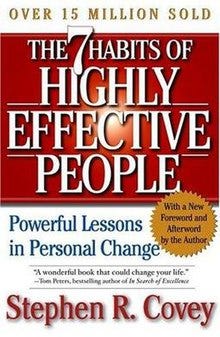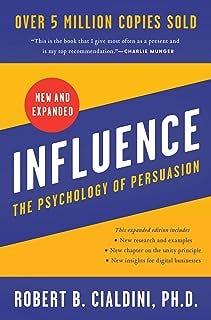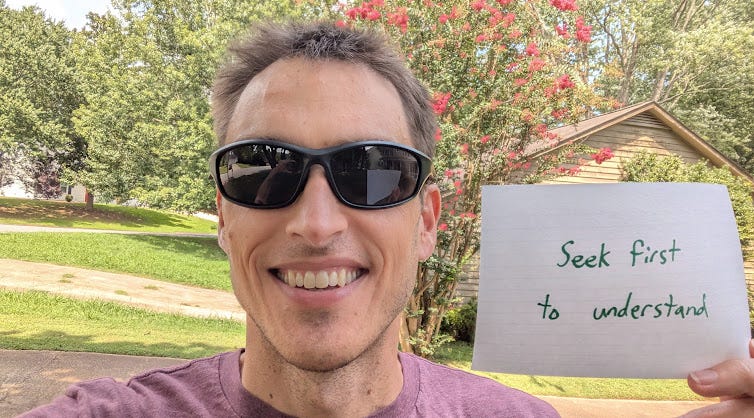(2 min read)
Don’t.
That’s the short answer.
Consider sales, politics, religion, parenting, or nearly any field (other than law).
If someone is trying to convince you, it doesn’t work.
Your guard goes up.
You get skeptical.
You wonder what’s in it for them.
So don’t set out to convince someone of something.
The best advice I’ve heard (and tried) so far is:
Be a doctor.
But not this doctor:
Imagine you visited a doctor who said:
Hi, nice to meet you. Here’s a prescription for some pills.You’d say, “Uhhhhh, no thanks” and get outta there.
That doctor didn’t take time to get to know you, your symptoms, your goals.
Didn’t diagnose the root cause of your problems.
Didn’t offer to answer any questions you may have.
Seek first to understand
It’s the principle that I find easiest to remember of The 7 Habits of Highly Effective People.
“Seek first to understand, then to be understood”
Use empathetic listening to genuinely understand a person, which compels them to reciprocate the listening and take an open mind to be influenced.
This creates an atmosphere of caring and positive problem-solving.
Consider the ancient Greek philosophy of three modes of persuasion, specifically in this order of importance:
Ethos is one’s personal credibility. It’s the trust that one inspires, one’s “emotional bank account”.
Pathos is the empathetic side, the alignment with the emotional trust of another person's communication.
Logos is the logic, the reasoning part of the presentation.
Many people skip to logic.
Worse, they jump to what they think is logic and skip asking questions beforehand that would reveal relevant context.
If you’re not thoroughly discovering concerns, are your recommendations really logical?
Side note:
Only just now did I learn the term Rogerian argument, (referring to psychologist Carl Rogers):
Instead of advocating one’s own position and trying to refute the other’s position, one tries to state the other’s position with as much care as one would have stated one’s own position, emphasizing what is strong or valid in the other’s argument.
Sounds like a much better approach than many people take.
This topic of persuading / convincing / influencing is fascinating, and someday I’ll probably write about Influence: The Psychology of Persuasion by Robert B Cialdini PhD.
But today, the reason this topic is on my mind is because:
I see so many people failing to be curious.
For example, Democrats and Republicans pointing fingers of blame (while plugging their ears).
Lack of curiosity is dangerous for us all.
We need to learn.
And we need to learn about each other.
Bullying will not be a long-term successful strategy.
If you want to win hearts and minds, try caring.
Obviously, most of what I’m suggesting here is easier to apply in 2-way conversations.
If you’re designing marketing to attract customers to your business or doing anything where there isn’t a dialog, it’s trickier.
But the same idea is helpful.
First you need to understand your counterpart at least as well as they understand themselves.
Until you do, you should only be asking questions out of genuine curiosity rather than making any claims.
Speaking of caring, if you haven’t yet seen this beautiful video from John Cena, check it out!
I was surprised and impressed.
(3m37s) “We Are America”
🕙 Recent posts:
🟢 Quick tip that increased my IQ and made me more compassionate
👀 Caught my eye this week:
I’ve been enjoying this guy “k boges”.
He has a zen-like way about him.
[…] Most of us are never going to be free of obstacles.
If anything, it seems like as life goes on, you end up with more responsibility and less free time, and you’re always a little more tired, and your resources seem a bit more stretched, and the list of things you have to do seems to grow, and the consequences for failing to do them seem to become more significant.
Maybe that changes at a certain age.
(I don’t know, but if it does, I haven’t reached it yet.)
But you know, even if the stars aligned and you found yourself in the perfect conditions, there’s still a really good chance that you would just find new obstacles in your way.
Because this is just how minds work.
We tend to focus on the things we can’t do instead of the things that we can do.
And when we think of things that we can do, we often think they aren’t enough.
But in reality, just about everyone has the capacity to do something to move themselves in the right direction.
And that something is likely more effective than you think.
[…]
(2m51s)









Thanks for sharing that great video about America 🇺🇸…politicians are the ones who need to watch it! 😉